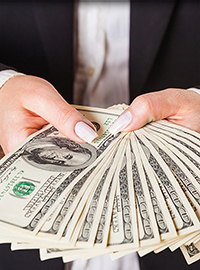| Hypocrisy: Unions Push Higher Minimum Wage Laws that Exempt Themselves |
 |
|
By Timothy H. Lee
Thursday, August 20 2015 |
In terms of sheer shamelessness, it's difficult to surpass modern labor unions. In one prominent recent example, consider the United Steelworkers' attempt to unionize college football players attending Northwestern University, one of the nation's most elite private institutions. This week, that attempt finally fell incomplete when the National Labor Relations Board, in a rare bit of sobriety, overturned a March 2014 decision by a lower regional director recognizing the amateur players as "employees" and allowing them to organize. Not that the NLRB offered a particular profile in courage, as it avoided the question of whether players constitute employees and instead declined on the basis of jurisdiction. Perhaps the NFL Players' Association will awaken and commence an intramural war with the Steelworkers over who gets the college players if and when they petition again. Unfortunately, the farcical nature of today's labor movement doesn't end there by any stretch. Across the country, Big Labor has played a leading role in pushing minimum wage increases, sometimes at twice the current federal floor of $7.25 per hour. Such efforts have succeeded in dozens of cities, Los Angeles and Seattle prominent among them, and the 2016 presidential campaign only adds an additional motive to fan this attempted conflagration. Union leaders and members certainly have every First Amendment right to advocate such laws, of course, regardless of their destructive overall effect on employment among poorer and younger Americans. But consider what their tactics reveal about the underlying merit and motivation of their movement. In many of the municipalities where they push minimum wage increases, unions persuade city leaders to specifically insert provisions excluding unions from the higher wage requirements. For example, an ordinance in San Francisco raising the city's minimum wage to $15.00 per hour contains a provision that it "doesn't apply to employees ... to the extent that such requirements are expressly waived in the collective bargaining agreement in clear and unambiguous terms." Labor leaders claim that such exemptions protect employers against potential lawsuits if the terms of existing collective bargaining agreements, which are governed by federal law, somehow conflict with the new local wage requirements. They also say that they need more latitude to negotiate on behalf of all of their members, particularly senior members whose existing wages would suddenly be matched by increases among lower-level members. According to Unite Here spokeswoman Maria Durazo, "If you leave it up to chance, you are setting yourself up for unnecessary litigation." That probably marks the first time a union official has expressed concern toward the problem of excessive litigation in our economy. Beyond such rationalizations, unions' true motivation is transparent. By creating special exemptions for themselves, unions gain additional negotiating power against employers. Specifically, labor leaders can present targeted companies with the choice of either accepting union representation or the higher costs that will come with paying the higher minimum wage. In light of the fact that wages and benefits constitute the highest portion of overhead costs to many employers, particularly in service industries, that can be a powerful lever for labor bosses. The city of Long Beach, California provides a textbook example. There, a new "living wage" ordinance mandating at least $13 per hour exempted union employees from that minimum. Soon thereafter, two Hyatt hotels unionized after a combative effort that included a boycott. In an era of declining union membership, especially in the private sector, union bosses are obviously willing to sacrifice the welfare of their lowest-paid members in order to boost their numbers and the mandatory dues that can be diverted to political contributions to leftist candidates and organizations. Glenn Spencer of the U.S. Chamber of Commerce hit the nail on the head when he said, "Unions hope these exemptions will pressure employers into welcoming an organizing effort, but there's no legal need for these carve-outs." Union leaders, members and partisan supporters have every right to act with such bald hypocrisy as they seek to maximize their influence over the 2016 elections and beyond. But leaders at the federal, state and local levels, as well as rank-and-file employees across America whom unions seek to persuade, should recognize their true motives and the degree to which they're willing to disregard members' well-being in pursuit of that partisan goal. |
Related Articles : |
























